Jackals' Revenge Read online
Page 15
And then the bombs began to fall, not in single explosions like the Stukas but in sticks of thousand-pounders.
As the first of them came down the floor of the ditch seemed to roll and heave like the deck of a boat in a heavy swell. Anna retched. Then another bomb exploded, closer this time, and the air around them seemed momentarily to have been sucked away. He heard her gasp.
He could hardly breathe. It felt as though the very life was being drawn out of him. His teeth seemed to rattle in his head. There was another explosion and then another, the shock waves from each hitting both of them like a blow to the guts. Lamb’s head was swimming with the pain from the relentless percussion of the bombs.
They were covered in earth from the walls, buried in a layer of it. He spat and motioned to Anna to do the same and then to close her eyes again but to keep her mouth open to avoid the deafening effect of the shock waves that he knew could have you bleeding from your mouth and nose.
More bombs came down, and more as they repeated the drill, spitting and inhaling as he told her with his hands, their eyes tight shut. He prayed that it would stop, certain that before long one of the bombs must find them as its target. And then, after perhaps ten minutes, he was aware that there were fewer explosions. And then nothing. That’s it, he thought.
Then, with ears barely capable of sensing anything, he heard a low drone unlike any he had heard before. Surely not another wave, he thought. Haven’t they done enough for one day? Or might it be something else?
No bombs had fallen for two or three minutes and Lamb peered over the parapet of their ditch at the devastated street. While one side of the main street was untouched the other row of houses and the yards that lay behind them had been all but obliterated. Amazingly, the church and the little kafeneio were still largely untouched, save for a few chunks of masonry which had been scooped from the church façade.
As they looked up more planes appeared in the sky above. Not bombers this time, but curious square-nosed and ribbed green Junkers 52 transport planes. Behind some of them he saw tow-ropes attached to gliders. They were flying like birds, he thought, in triangular groups of three.
This was it. He looked again at his watch. It was 8 a.m. There was no time to lose. He pressed Anna to him. ‘Open your eyes. Quick. The Germans are here.’ She looked at him and then at the sky, and gasped. ‘I’ve got to find the company. Can you go back to your house? Find your father and brother. Are you all right?’
She nodded. ‘Yes, of course. Take care.’ She squeezed his hand and kissed his cheek then turned and began to run down the rubble-strewn road.
Lamb turned west and made for the olive grove where the company was encamped.
As he half walked, half ran towards his men, he watched as the planes continued to come in overhead. There seemed to be hundreds of them in the air, filling the blue with their black crosses. The Dorniers were coming in low and strafing the houses with lead. Stukas banked and swooped, nose-diving gun emplacements, while transport planes plodded above them and tiny Me 109 fighters spiralled up into the high blue. How many of them could there be? he wondered. Were they sending an entire division to Crete? A corps of paratroopers? Reaching the grove, he found the men staring upwards.
‘What are you doing? Where’s the sarnt-major? Where are the lieutenants?’
He saw Bennett pointing skywards, his face a mask of schoolboy wonder. ‘Look, sir, parachutes. They’re parachutes. Now I’ve seen everything.’
In the cloudless azure sky above them dozens of white parachutes were blossoming. With them were other chutes of different colours: red, green and yellow. It was beautiful, hypnotic, like so much confetti raining down on them. The strange shapes tapered upwards to a mushroom balloon: umbrellas, twisting and swinging in the sky as they fell earthwards.
Mays spoke. ‘Bloody hell, sir. They’re not real, are they? They’re only dummies, aren’t they, sir?’
‘No, Sarnt. They’re real all right.’
Lamb stared at the falling objects, marvelling at their grace. They seemed so very serene. How, he thought for an instant, could anything quite so beautiful be dangerous? The men attached to them were small too. Like dolls. Harmless little toys.
Bennett broke the spell. ‘They’re Jerry paratroops. Stand to.’
Lamb joined him. ‘They’re paratroopers, all right. Get the men fallen in, Sarnt-Major. Lieutenant Eadie, Mr Wentworth, find your platoons. Get moving. There’s more on their way.’
And there were. The skies above them were suddenly filled with parachutes. Lamb counted. Five, ten, thirteen, thirty. He gave up. He saw that the different colours denoted the nature of their load. White for the paratroopers, red, yellow and green for large canisters, presumably weapons, and equipment of different types.
Seven chutes, mainly white, came down to their immediate left.
‘Over there. Get them.’
One man was down trying to untangle his chute. A man from Mays’ section shot at almost point-blank range, blowing him off his feet. Two more chutes had landed in the taller trees. Bennett fired his Thompson gun at one of them and, riddled with holes, the man shook and then hung there limp, like the body of some pirate, suspended from a gibbet, thought Lamb. The other man, caught in a tamarisk tree, was trying to extricate himself from his chute while at the same time sending sporadic bursts of fire into the men on the ground. A round from one of them caught one of Corporal Beaumont’s men in the shoulder. Eadie ran across. ‘Don’t worry. I’ll get him.’ As the panic-stricken German looked down he raised his revolver and fired hitting not the paratrooper but his load of grenades. The paratrooper blew to pieces, showering all in his immediate vicinity on the ground below with his blood and guts. One of the men threw up.
They were coming down faster now, more of them firing their submachine-guns wildly at the ground as they came.
There was no need for Lamb to give commands. His men knew what had to be done. As the shots hit their mark the falling Germans would shake, go limp and then suddenly straighten with a jerk before drooping again just as they hit the ground.
One of the new intake, Shaw, smiled at Lamb. ‘I got that one, sir.’
‘Just keep shooting them, son. They’re still coming.’
And they were. But as fast as they came they were spotted, and as soon as they were spotted they were shot. The men did not have to aim, they just fired. It took only a few minutes to absorb the finer points of this new game. It was better to shoot at the feet, then you would be certain of hitting the target and disabling it at least. Or you could load an incendiary bullet and go for the parachute itself which, bursting into flames, would collapse and send its owner plummeting to the ground. This was absurd, thought Lamb, like shooting high pheasant. No, it was ten times easier than that. He wondered for a moment if they should stop, give them a chance. But logic dictated that they must be killed in the air, and another random burst from above him brought him to his senses.
‘They’re firing at us now,’ he shouted. ‘Keep firing. Shoot them before they land.’
He knew in his heart that it was beyond the principles of war to shoot a helpless man, but anyone could see that this was the only way the defenders were going to have anything like a chance. Quite apart from the machine-guns from above and the small arms, Tommy guns and Lewises from below, the noise was deafening now. Above them the sky was filled with planes. Stukas had returned with a fighter escort, and even as more transports came in, circling in a pattern above them, they were dive-bombing the British and Commonwealth positions. The stream of transports seemed endless. Observing them more closely, Lamb calculated that the paratroopers would jump out at a height of 300 feet. That was not without its dangers. Whoever had devised the V formation seemed not to have accounted for the airspeed. As Lamb watched he saw several of the figures who left the lead aircraft hit by the wings of the other two, killed in mid-air before their chutes had even opened. One man was decapitated. Another jumped, and his chute, opening too soon, was sna
gged on the tailplane of his own aircraft, pulling him along in its slipstream. It was a horrific scene. But even so, with all the mistakes, the Germans’ tactic seemed to be working. For the most part the paratroopers were making it out of the transports and into the skies and descending on them.
The Bofors guns in the anti-aircraft pits around the airfield at Maleme and those near Galatas had opened up in earnest now, and as Lamb watched he saw the familiar puffs of smoke which marked their shots. One of them scored a direct hit on one of the gliders and it disintegrated before his eyes in a sheet of flame. Another shot hit one of the Ju 52s and the aircraft broke up, the men inside falling out of it like so many sacks of potatoes. He hoped for their sakes that they were dead already. The gliders came in over their position in a sinister silence, just a sudden swish. Looking at one of them, Lamb and his men were able to see their enemies’ faces peering out of the windows.
Beaumont was beside him, and paused to reload. ‘Did you see that, sir? Jerries. They looked bloody terrified.’
‘Well, wouldn’t you be, Corporal? Coming down on us.’
All around them it seemed that the units encamped in the trees had begun to fire now, and from the olive groves off to his left occupied by the New Zealanders came the staccato chatter of machine-guns, along with screams. Behind him he could hear the woof of Bofors guns and then more German fighters, 109s, appeared in the sky and swooped down to machine-gun the positions to the rear of where the paratroops were landing.
Some of the Germans at least had made it to the ground, and Lamb knew that those vital few minutes when they had been at their most vulnerable were almost over. To their right he glimpsed a grey form running through the undergrowth. ‘Over there. There’s one of them.’
Simultaneously a dozen rifles opened up on the area where Lamb was pointing. There was a short shout and then nothing, but almost at once he saw other grey shadows – to their front this time. They must be searching for their weapons containers, which had been dropped separately. He had seen them come down, the ones with the coloured chutes. He wondered if there would be any chance of his own men getting their hands on them. Perhaps he might even get hold of the Schmeisser machine-pistol he longed for.
Lamb wondered where the gliders had landed and whether their passengers had made it. He turned to Bennett. ‘Did you see where those gliders came down, Sarnt-Major?’
Bennett pointed towards the airfield. ‘Somewhere over there, sir. To the west, I reckon. They’re after that airfield.’
He was right, thought Lamb. Maleme would certainly be their target. That and the anti-aircraft batteries. Get the batteries, and you could bring in the transports to land on the airfield, and when you managed to do that there would be no limit to the number of troops you could bring to the party.
Sitting hunched up in a glider towed behind a Ju 52 transport plane, heading away from Athens towards Crete, Generalleutnant Wilhelm Sussmann, commander of the 7th Fallschirmjäger Division, looked down at the sparkling sea below them and smiled. They were clear of the Greek mainland now and the islands, and everywhere the sky seemed to be filled with other planes of his division. Nine battalions, each of 700 men, plus the support troops – a total of some 7,000 men heading towards their island objective. Heading towards glory. This was the biggest thing yet for his beloved Fallschirmjäger, the Führer’s favourites. Sussmann’s men had been all set to take Lemnos and then diverted to the Corinth Canal. That had been a glorious day. But this would be bigger by far.
After an initial glider assault on key anti-aircraft batteries there were 3,000 of them jumping in the first wave with another 3,000 in the second and then more glider-borne troops. Once the paratroops had secured the airfields, then would come the men of the 5th Gebirgsjäger Mountain Division, Ringel’s men, skilled since their childhood in climbing alps not unlike the mountains which filled inland Crete, men who proudly wore the edelweiss as their badge and were now trained to fight in those mountains. How could the Allies resist them? Besides, intelligence reports had told them that the island was poorly defended, no more than a few thousand men. It had even been suggested that the Cretans, disaffected as they were with the Greek monarchy and Metaxas’ regime, would welcome them with open arms.
Sussmann smiled and nudged his aide-de-camp, Captain Scheiber. ‘All right, Scheiber? We’re going to do it this time, eh? Something that’s never been attempted before. We’re jumping into history, my friend. We’ll give those Tommies another bloody nose. They don’t know when they’re beaten.’
‘No, General.’
A huge Ju 88, its twin engines throbbing, came perilously close to their glider, and then another.
Christ. They’re getting too close. What the hell are they doing? Those bombers should be nowhere near us.
He turned to Scheiber. ‘What the hell do they think they’re doing? Can’t they see they’re in the wrong lane? They’ll …’
At that moment there was a terrific lurch, enough to break harnesses. One of the men was thrown to the other side of the glider, another to the floor.
Sussmann knocked his helmeted head against the pierced metal of a fuselage strut. He swore and as he did so he was aware that they were suddenly not moving as fast as they had been. There was a yell from the pilot.
‘Our tow-rope’s snapped. Everyone brace yourselves. We’re going down.’
Sussmann looked below at the sea and saw nothing but blue. They had already passed the island of Aegina and he knew there was nothing now between them and Crete. He had no way, though, of gauging how far they had gone.
He turned to the others and saw their ashen faces.
‘All right, boys, we’ll make it. Who’s got a chute on, apart from me?’
He did not hear the replies, if there were any. As he spoke, there was a terrific crack and he looked on in horror through the tiny window as the left wing broke off the fuselage. One of the men yelled, ‘Shit. The wing.’
Scheiber stared at him. ‘General, what do we do?’
There was a split second that seemed to last an eternity and then he heard another voice mutter in the darkness ahead of him, ‘Oh God, no. No.’
Sussmann said nothing. He looked at Scheiber’s pleading eyes and knew what would happen next. But he was surprised, for instead of going straight into a spiral dive the aircraft stalled and then, with another crash, the right wing was gone. For a moment they seemed to be hanging, suspended in the air. No one spoke. There was no sound, save the rushing of the wind.
But only for a moment. Suddenly the glider gave a lurch. There was a yell from the pilot and they were all hurled forward as the useless capsule that had been the glider turned on its nose and began a headlong descent to the earth. Arms, heads and legs collided with weapons, metal and splintered wood. A huge shard of fuselage drove straight into Scheiber and skewered him to the roof. Dark blood gouted from his mouth. Sussmann turned away and, being at the rear, managed to pull himself up, out of the mass of bodies, kicking down on the soft flesh of someone’s face with his jackboot. He reached for the jump door and wrenched on the handle, opening it to the rushing air, then with an effort that took every ounce of his strength he hauled himself to the opening. The pressure against his face was incredible and for a moment he thought he would not manage it. But then he kicked again against something, not knowing or caring what it was, and he was through the hole in the fuselage and out, free of the hurtling wooden coffin, in empty space.
He was falling, hurtling through the sky, a helpless Icarus without his wings. Sussman threw his hands wide in the crucifix jumping position and then turned his head to the right and watched as the wreck of the glider, still with the others on board, fell away below him. He could see their bodies falling from it as it neared the sea, black specks dropping into infinity, and for a moment he prayed that they might be still alive, trying to save themselves. But then he wished them dead, for he did not think they had any hope. But he was free.
Sussmann said another prayer to the G
od of soldiers and felt the jerk upwards as the chute opened. Thank heaven for that. Then he looked down, expecting to see nothing but the Aegean below him. But there, just beyond the tip of his boot, was land. Through a gap in the clouds the landscape of Crete opened out before him. He saw the tips of the White Mountains first and then, through the hurrying cloud, lying at an angle, the outline of the island, looking like a long fish. The area on which he might hope to land, if he were not to ditch in the sea, was on the bottom right of the island. He tried to visualise the map and saw that he was on the north-west coast, surprisingly close to their objective. Ahead of him and below he could see the other transports on their journey into battle. The wild idea came to him that, far from being doomed, he might actually find his men and go ahead as planned. It gave him new strength as above him he watched the stream of bombers on their way to destroy the waiting enemy. This was hardly as he had envisaged his arrival, but anything, thought Sussmann, was better than the fate of his poor comrades.
On the slopes of Pink Hill there was firing from all sides now, and although they could hear the firecracker rattle of small arms and shouting there was for a moment a strange lull in the airborne invasion, fewer planes in the sky, and it seemed, bizarrely, that no more paratroops were dropping on them.
Mays scanned the skies. ‘Is that it then, sir? Do you think that’s it?’
Lamb shook his head. ‘I doubt it, Sarnt. They mean business.’
There was a noise behind him and Lamb turned, ready to shoot, but saw instead a khaki uniform. A runner. ‘Captain Lamb, sir?’
‘That’s me, yes.’
‘From Colonel Kippenberger, sir, 10th Brigade. Looks like a whole German paratroop battalion has dropped on top of us. Colonel says that some of them have dropped near here, sir, some way short of their objective. They’re after the prison, sir. They’ll be trying to regroup. The colonel says you need to counter-attack, sir. To link up with 6th Greek Regiment, up at Cemetery Hill.’
Lamb looked at him. ‘Those are my orders? To counter-attack a battalion of paratroops with half a company and a few Greeks?’

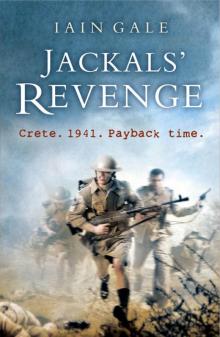 Jackals' Revenge
Jackals' Revenge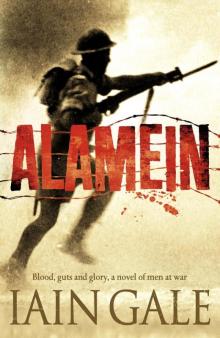 Alamein
Alamein Conspiracy
Conspiracy Four Days in June
Four Days in June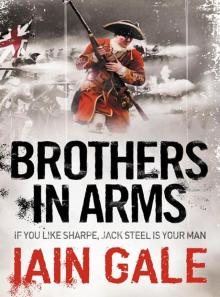 Brothers in Arms (Jack Steel 3)
Brothers in Arms (Jack Steel 3) Brothers in Arms
Brothers in Arms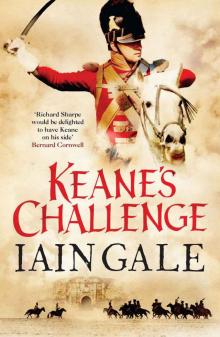 02 - Keane's Challenge
02 - Keane's Challenge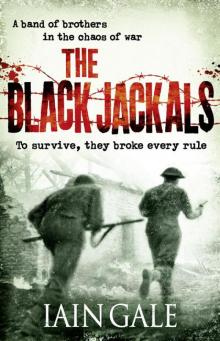 The Black Jackals
The Black Jackals Man of Honour
Man of Honour Rules of War
Rules of War